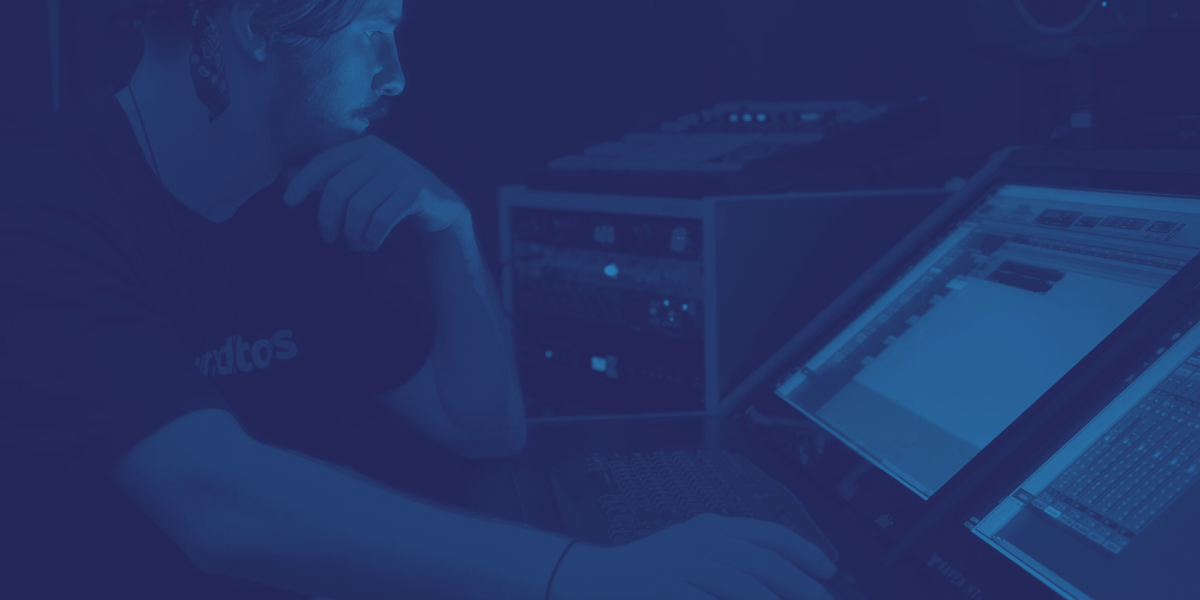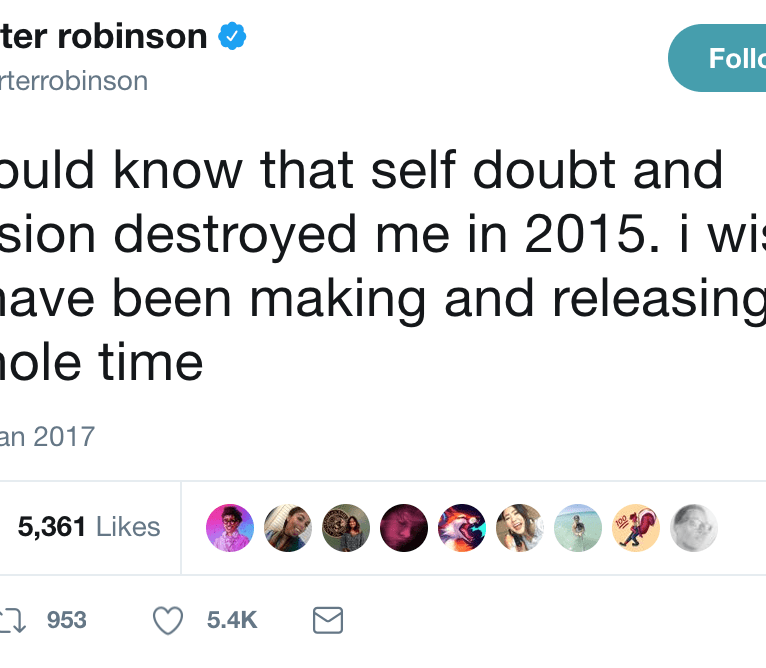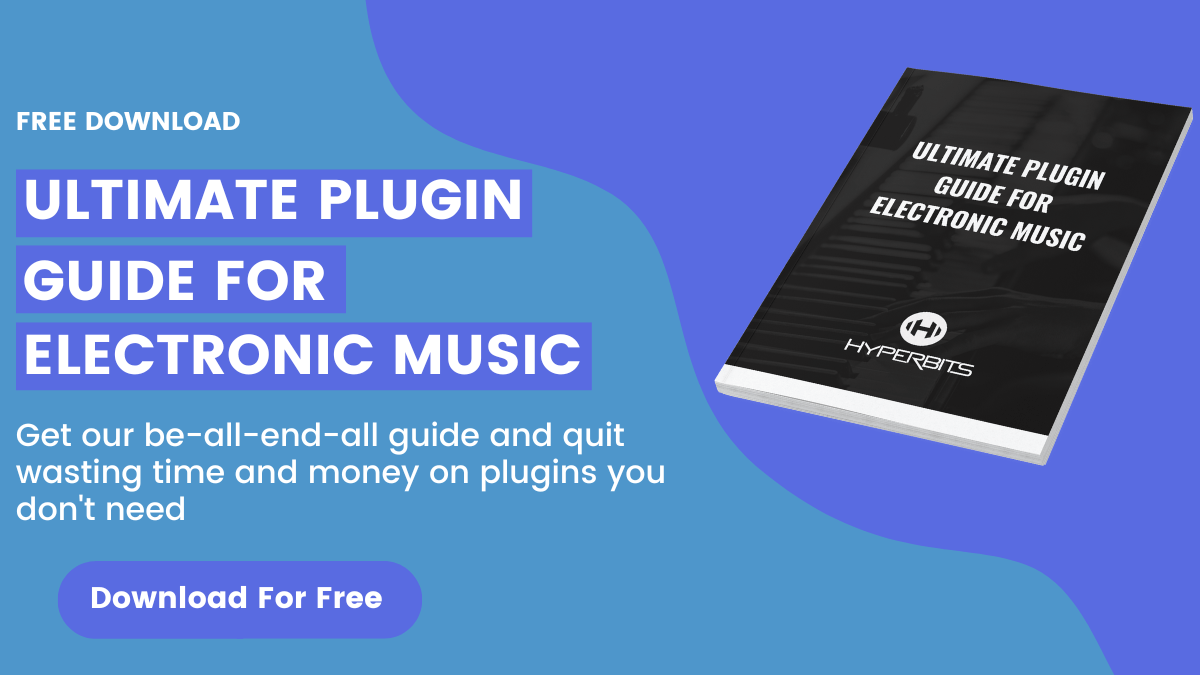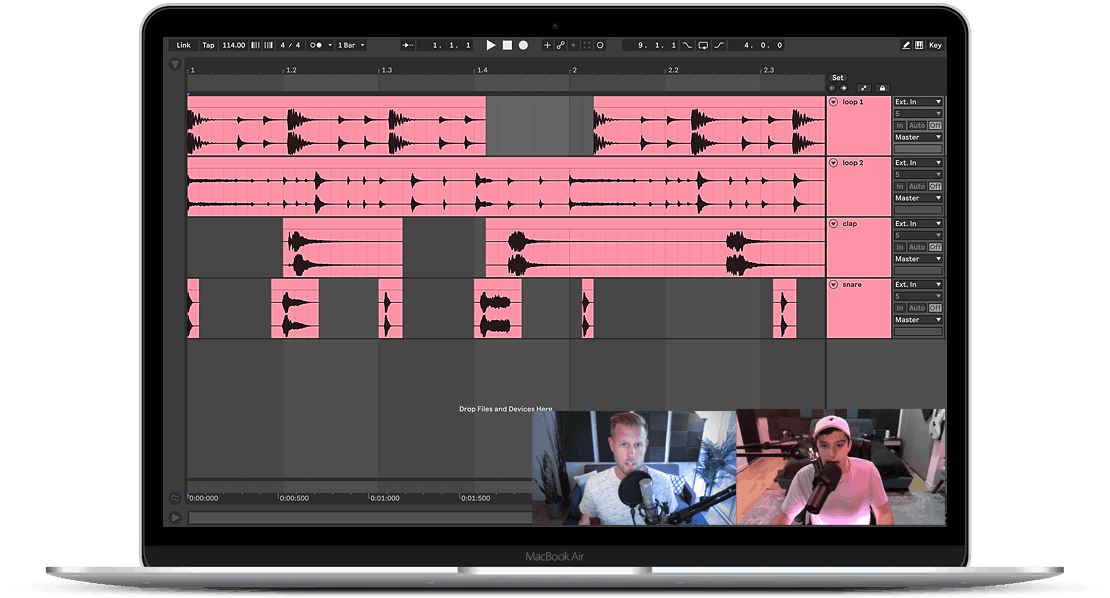20 Lessons In Music Production I Wish I Knew When I Started
"I urge you, please – more than anything - break the damn rules. In fact, learn the rules, just so you can break them. "
— Hyperbits
Hey, Hyperbits here.
Guess what? It’s story time, kids.
But I’m not writing to you… I’m writing to myself. Well, the old me.
I’m writing to that insecure but ambitious 22-year-old who had never made music on a computer, almost 9 years ago.
I’m writing to that young-dude who was trying his absolute best to navigate life and find his way in music production.
Man, there is so much I could tell you.
Like the fact that you’ll sign your music to major labels. You’ll leave corporate America. You’ll go on tours all around the country. You’ll meet tons of industry professionals. You’ll make a living doing what you love.
Hell, you’ll remix Beyonce. You’ll also make hundreds of songs the world will never see. You’ll make a lot of friends, but you’ll lose some too. You’ll eventually start an online music school. You’ll be fulfilled. You’ll be empty. You’ll be alive. You’ll be tired. You’ll experience almost everything you thought you never would.
So, let’s sit down and have a chat. I’ve got a lot to share and a lot of ideas and concepts that might help along the way.
1. Less is more.
Music production is without a doubt, complicated.
And because of that reality, it’s ridiculously easy to always dig deeper, to always want more.
But do you really need 9 different synths? Do you really need 16 different saturation plugins? Do you really need to watch YouTube tutorials until your eyes bleed? Does that drop really need that extra layer?
Talk to almost any professional, and they will tell you that learning one synth inside and out will go a lot further than learning 10 different synths at a mediocre level.
And while we’re at it, stop masking your music’s imperfections with additional layers. Get it right from the start, and don’t rely so much on hiding what’s wrong.
I’m not saying there isn’t value in staying hungry (more on that later), but in my experience, less is because it forces you to make progress with your music by looking inside yourself instead of always reaching for something external or abstract, which of course, is not in our control.
Anyway, sometimes, someone has said it better than you ever could, so listen up. Long before you ever started the Hyperbits Masterclass, your former Dubspot professor (and current head-honcho of the Wyatt Mix-Master Academy) had a lot to say about this topic of less is more:
"Here's how I explain it. When you learn martial arts, you spend countless hours performing long sequences of techniques called 'forms.' These 3-5 minute fixed sequences are the heart of martial arts training.
However, if someone stops you on the street to pick a fight, you don't break out your long, fixed sequences to defend yourself.
Actually, the better you get at martial arts, the more skillful you are at unleashing the maximum amount of power with the fewest number of moves."
— Danny Wyatt
2. Relax, the race is long.
Man, you used to be so bad at this.
You believed you could force your way into the industry. You thought that by working harder and longer than everyone else, you could do more and accomplish more.
You thought you could out-work all the competition. And sure, it might’ve helped a little - but music doesn’t work that way. Life doesn’t work that way.
So, take your time; there is literally no rush. The race is long and you are young.
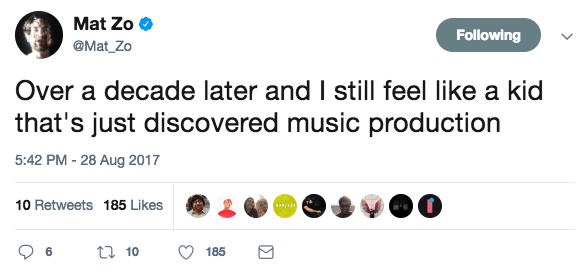
3. You are never too old to start.
And this leads me to my next point, you’re never too old to start.
You didn’t start making music on a computer until you were 23. You’ll eventually see in your classes that you have students in their 40s and 50s. And guess what? They are killing it and making dope music.
So first and foremost, it doesn’t matter how old you are, if making music is something you want to try, start today.
Not tomorrow. Today!
4. Never stop learning. F*ck complacency.
You’ll have to realize that it never stops.
Whether you’re a superstar like Skrillex, or just a kid in their mom’s basement, the drive to get better and learn more should never diminish. The second you think you have succeeded - whether commercial or personal – it’s only the next step in a never-ending staircase.
You can’t allow yourself stay stagnant and not strive for improvement. Otherwise, your art will become stale, and perhaps more importantly, you’ll feel less fulfilled or challenged in your work.
To aid in your music production journey, here are some of my favorite resources I’ve spent the last several years digging through:
- Sound on Sound
- Attack Magazine
- EDMprod
- Audiotuts
- Pro Audio Files
- Bedroom Producer Blog
- Sonic Academy
- Future Music
- How to Make Electronic Music
- Home Studio Corner
- Get That Pro Sound
- Modern Mixing
- Behind the Speakers
- David Glenn Recording
- Sound Gym
- Mastering the Mix
But hey, don’t make this a priority – just bookmark these sites and comb through them when creativity is lacking and you’ve already tried making music for several hours.
5. Writer’s block is a myth.
Speaking of creativity – writer’s block is absolutely, definitely, undeniably, 100% - a myth. Creating music is a sum of your habits. And you’ll need to learn that in order to get in the habit of starting, progressing and finishing music, you need to make finishing music an absolute priority.
It doesn’t always come easy, but it does get easier. The hardest part is sitting down and getting started. But once the idea progresses, or you feel that initial spark of excitement - I often find that I get motivated after the fact.
That means mood follows action. Next time you’re tired from a long day, or simply feel like shit for whatever reason – just sit down. And get started. You’ll be amazed by what follows.
If you're still stuck getting a song going, check out 8 Creativity Hacks: How to Start Your Song in an Empty DAW.
On top of that, the most fundamental component of writing memorable music is composing chords and melodies. If you don't feel comfortable with this, it's time you get down with music theory. It's easier than you think and it will propel your music to new heights. After all, listener's don't connect with EQ & compression, they connect with great songs.
6. Put yourself out there.
This one’s important – so listen up.
Don’t be afraid to show the world who you truly are as an artist. Don’t get caught up in what’s cool right now. You don’t get burned-out because of the work itself, you get burned out because you forgot why you’re doing it in the first place.
That sounded so good, I’m going to repeat that:
You don’t get burned out because of the work itself, you get burned out because you forgot why you’re doing it in the first place.
Plus, I can’t stress enough how many times you found yourself loving a new song, and trying desperately to make a similar track. And guess what? It almost never worked. So sure, go ahead and borrow some elements from a current genre that you might find really dope – but the second you are creating music for the purpose of external gratification, you’re losing the entire point.
And btw - if someone in the industry wants to hang out. Show up. Don’t over think it – just be there.
7. Kill self-doubt & fear.
I can guarantee you that every great artist in history has gone through a period of self-doubt and frustration. One of the true measurements of your talent as an artist is simply your ability to foster self-doubt in a positive light.
I mean, look at what Porter Robinson, one of your ALL-TIME favorite producers, tweeted in 2015:
If someone as successful as Porter can feel self-doubt that late into his career, accept the fact that it is perfectly normal. Don’t let self-doubt discouraged you and stop driving what you love.
So, listen up – self-doubt is perfectly ok. Acknowledge that it exists, but don’t let is ruin your love for music, and certainly, don’t let it grab that steering wheel.
"Dear fear & self-doubt, You’re allowed to have a seat, and you’re allowed to have a voice, but you are not allowed to have a vote.
You’re not allowed to touch the road maps; you’re not allowed to suggest detours; you’re not allowed to fiddle with the temperature. Dude, you’re not even allowed to touch the radio.
But above all else, my dear old familiar friend, you are absolutely forbidden to drive.”
— Elizabeth Gilbert
8. Trust your taste.
At the end of the day, there are very few things that make producers different from each other. You have access to the same tools, the same sounds – you are playing the same game in the same reality as everyone else – but what really sets you apart? Well, it’s your taste.
Your taste determines what we think is dope. It makes you different. It acts as a driving guideline and forces you to work towards certain standards.
Your taste determines who you are as an artist. It can be said, arguably, that being an artist is just one super-long battle where we are desperately and furiously, attempting to make our ‘taste’ into a reality through the form of the music we create.
So, if that’s all you’ve got – trust your taste.
And if I didn’t say it well enough, maybe you’ll listen to Daniel Sax's video by Ira Glass:
And better yet, steal from your taste. Check out 10 Ways to Steal Like an Artist.
9. Check your ego.
I’ll leave this one short. But hey, chill out on the ego. Be nicer to everyone.
Disliking pop music doesn’t make you cool, it makes you short-sighted. Hating on the latest trends doesn’t make you some bad-ass hipster with better taste and ripped jeans – every style, every genre has something worth learning from. If you can’t eventually grasp that, you should find a different career.
Oh, and one last thing – avoid people with insanely large egos.
10. Don't over-spend.
The similarities between entrepreneurship and music production are absolutely huge. One of your future favorites, Gary Vaynerchuk once said:
“Do you really need that ergonomic chair? Do you really need such a nice office? Businesses need to make money and if you’re not profitable, you’re not doing your job. Don’t spend too much before you’re ready. Hustle early and late. Stay lean.”
How does this apply to music? You don’t need to spend professional-like prices for something you are just starting to get into. KRKs are fine at the start. You don’t need an Apollo Twin right away. You also don’t need a $600 pair of headphones at first.
If you’re in your 20s, you shouldn’t buy your Mercedes dream car, you should get a used Honda Civic. The same goes with music…
Take everything with strides. Once your music starts supporting you or you see significant upticks in feedback and progress, then and only then, should you even consider spending a ton of money on equipment.
You did this right, old friend – you produced on the same old laptop and speakers for over 3 years before you decided to take a production class, and eventually invest in some better speakers and a work-horse computer.
But hey, don’t get too cocky – this is the only time I’m patting you on the back in this entire letter.
11. Stop being so damn intimidated.
I can’t stress enough how many times you’ve worked yourself up for no reason. And hey, maybe this is a personal issue, but relax dude! You don’t need to be so intimidated by every industry professional or artist that wants to work with you.
The reality of this industry is that it isn’t that big, so what you say and do matters, how you carry yourself matters - but that doesn’t mean every person you speak to is going to make or break your career.
And when you get in the studio with a new producer, it’s just an opportunity to learn new skills and to see how someone else gets something done. You don’t always have to man the helm and carry all that weight on your shoulders. If anything, it should lesson the load – and doesn’t that feel good?
12. Referencing is everything.
Speaking of music production, when you’re in the studio – referencing is everything. This isn’t about copying, it’s about using reference material to calibrate your ears. Unfortunately, your own perception for what you think you are hearing is pretty damn awful. Everyone’s is. And not only is it bad, but it changes on a daily basis.
So how do you implement reference tracks? Something as simple as listening to your reference during breaks, both in the composition and mixing phases will drastically help the process of calibrating your ears. This is really the only way to become more and more familiar with what constitutes a beautiful and proper sounding mix.
Without referencing, you’ll get lost. In fact, you’ll get so lost that you could spend hours and destroying a mix because you weren’t using something as simple as a reference track.
13. There is no such thing as ‘making it’.
I didn’t forget - I remember what you used to do. During those late nights, you’d put on headphones and envision your music being blasted to thousands and thousands of people. “Once I’m playing my music at a festival, then – and only then – will I have made it,” you used to think. Then, and only then, will you be fulfilled as an artist.
Well, sorry to break it to you – but it’s a lie. Look, with the exception of the select handful of artists who fly private jets to every show and demand over $50-100K per show, ‘making it’ is a very abstract idea.
Mat Zo tweeted in 2015 that ‘making it’ doesn’t exist – despite the fact that he was touring the world and releasing amazing music loved by millions. Markus Schulz was constantly obsessed with selling out a stadium tour, despite the fact that he sold out every club he played.
The point here, is that everyone’s definition of ‘making it’ is constantly evolving and changing and relative. You’re not Mat Zo or Markus Schulz, but if I told you what you’d accomplish over the next 10 years, I’m sure you’d believe you’d made it. But here we are, and I realize it’s just an idea, not a destination.
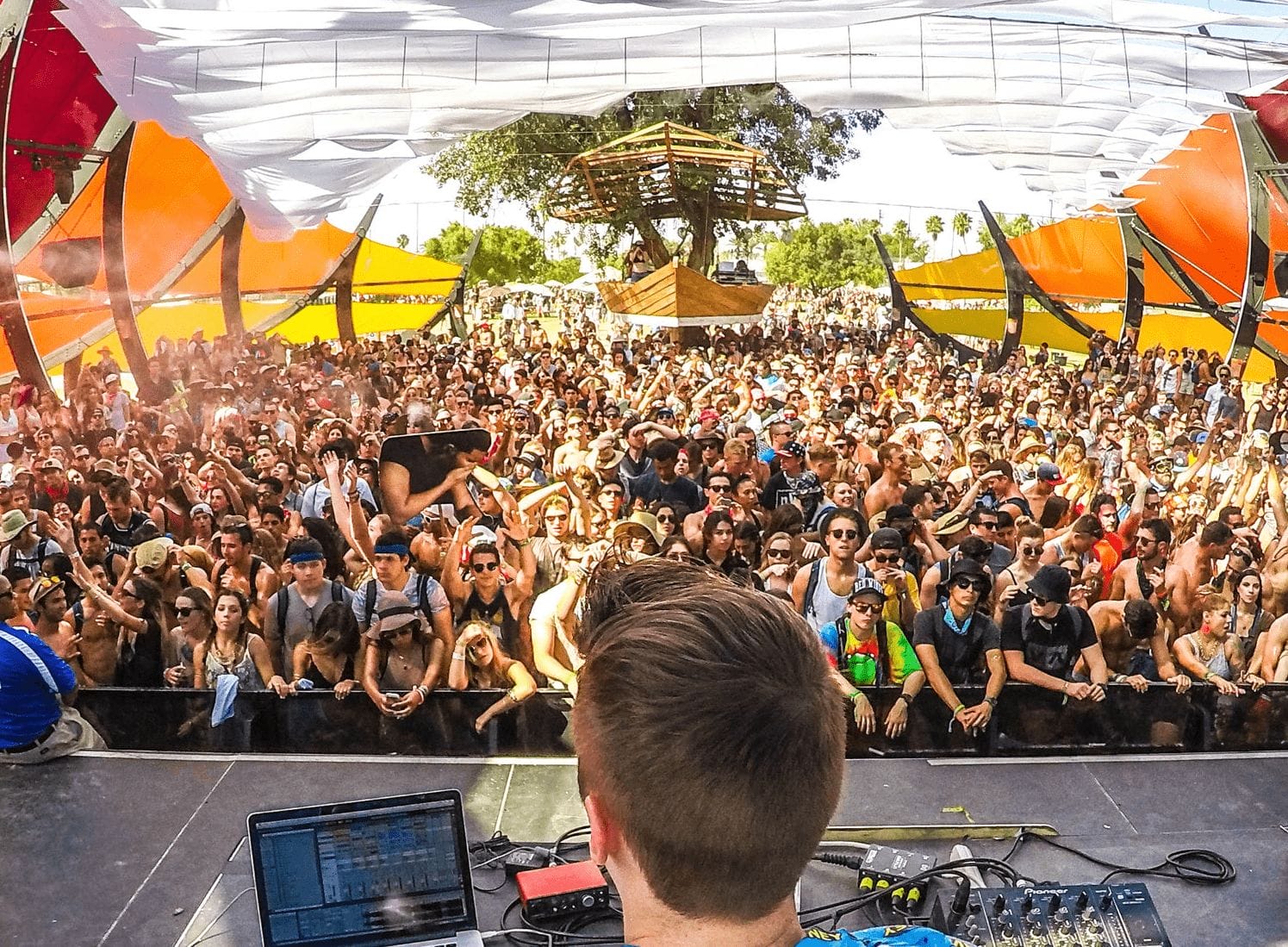
14. Don’t pay attention to everyone else.
On that note, stop paying attention to everyone else. Figure out your own dreams, desires, and goals – and attack those aggressively. Turns out, my definition of success is pretty simple: waking up every single day and making a living doing something you love. Everything outside of that is pretty silly.
Every industry has their rat race. Choose to opt-out and do what makes you the happiest, whatever that may be.
15. Don’t stress too much about money.
I know that’s a loaded statement but look, if you pursue a passion, and own your craft, there are TONS of ways to eventually make money. So, instead of worrying about money, just get insanely good at what you want to do. And even if you were broke for a little bit, there is nothing wrong with that.
In fact, it can be quite fun and kind of stoic. Living lean and scrapping to pay rent helped you access what really mattered to you in life. Plus, it’s crazy how little you need to survive.
Sure, I could’ve gone back to a corporate job to help pay the bills. But I would’ve ended up in the same place I had started. Again, there is nothing wrong with taking a few steps back to take a few giant leaps forward.
And since Alan Watt’s says everything better than me, watch Edgar Alves's video ‘What if Money Were No Object’ to further progress this point.
16. Invest in yourself.
I know, I know - I just said not to stress about money, but this goes both ways – in earning and in spending. Want to enrich your music journey by reading a book? Awesome. Think you should take a class or hire a coach? Dope. Should you go to that festival? Probably. Will this sample pack help me finish my next track? Most likely.
That innate pleasure you feel from doing everything yourself is really just pride getting in the way of what you are trying to achieve. Ask for help. Spend for help. It makes things a lot easier.
To do this day, that one class you ended up taking that cost over $3K changed everything for you (plus, taking that class eventually got you fired from your corporate job, which was literally the biggest blessing in disguise in your entire life). Without that class, you never would have been able to build a career out of music production.
17. Make health a priority.
As someone who prides himself on working harder than everyone else, making health a priority took a while to build into my life. Not too much phased me in my early twenties – I could go out drinking with my friends, eat Taco Bell three times per week and like magic, my metabolism took care of the rest.
But as the years progressed, things started to catch up with me. Drinking was more of a distraction than anything. All that sitting you were doing when making music started to reappear as lower back problems. By not moving around that much every day, your strength started to suffer. You started to gain weight. You got more anxious.
So, what is the solution?
- Get outside more.
- Lift more weights.
- Take fitness classes.
- Go for runs, go biking.
- Go hiking, go camping
- Drink a green smoothie
- Eat less meat
- Stay away from that processed sh*t.
- Invest in a standing desk
- Stretch and foam roll
Immerse yourself in some sunshine and reap the ridiculous benefits. Plus, nothing inspires you more than getting away from my studio – so, stay healthy my friend.
18. Be ruthless about finishing songs.
Easier said than done, I know. But focus on the whole product – the entire song first. Mixing, sound design and creating commercially relevant music is tough, but you’ll get there, eventually.
Prioritize finishing entire songs before you spend 3 and a half hours creating the perfect kick drum or the perfect side-chain to your vocal reverb.
Plus, getting in the habit of finishing music exposes your weaknesses. Think about it. Oh, every song you finish has poor arrangement? Weak sound design? Has an amateur mix?
Well, now you know what to tackle, so get to it. Better yet, check out my 8-Step Finishing Checklist.

19. Give more than you receive.
Every time you’ve prioritized giving – whether it’s in the form of feedback, sharing sounds or samples, offering advice, whatever – it comes back to you 10x. Meaning the more you give, the more you seem to receive. That may sound like it is rooted in some negative intentions, but if you do it genuinely with no expectations in return, I swear you’ll see that life gets better and better - professionally and socially.
There’s a ton of music producers who think they need to hold on to all of their secrets. That if they shared some patch or sample or chord progression, they’d be inviting and promoting copycats. To those guys, I say this:
- Even if they did copy you, so what? Let them be second.
- Even if they had the same exact sounds as you, they’d still make something wildly different.
Plus, in reality – sharing is the best way to build your network because you’ll be providing value to others. And btw – it helps to do with a smile.
20. Break the rules.
Now that I’ve told you almost twenty different rules, ideas and concepts to embrace, I urge you, please – more than anything - break the damn rules. In fact, learn the rules, just so you can break them.
Not to get all Robert Frost on you, but digest as much information as you can, so you know why you’re taking the path less travelled when you finally do.
And finally, last thing here – stop taking everything so seriously. You’ll thank me when you’re older.
Summary
I know you sometimes like to skim stuff, so to summarize:
- Less is almost always, in fact, more.
- Relax dude, the race is long.
- You are never too old to start making music.
- Never stop learning. F*ck complacency.
- Writer's block is a myth.
- Put yourself out there and show up.
- Self-doubt sucks. Fear also sucks. Learn to work with that.
- Trust your taste more than anything else.
- Check your ego at the door.
- Don't over-spend. You’ll have the chance to spend more later.
- Stop being so damn intimidated and get out of your head.
- Referencing is everything. Literally everything.
- There's no such thing as 'making it', or at least Mat Zo thinks so. And I trust him.
- Don't pay too much attention to everyone else. Do you.
- Don't stress too much about money. Work for less at first. Charge more later.
- Invest in yourself. It’s ok to spend on what matters.
- Make health your number one priority. And get outside, a lot.
- Be ruthless about finishing songs.
- Give more than you receive.
- Break all the rules, you’ll thank me later.
Cheers,
Hyperbits



